 |
|
|
|
|
|
|
|
 |
 |
 |
 |
|
|
 |
 |
 |
|
|
|
|
|
|
 |
They were (almost) never better than they were here. I loved their performances but unfortunately could only see it on dvd. Jane Alexander went on to create (for me anyway) her greatest role onscreen in 'TESTAMENT'.
|
|
|
|
|
 |
I was fortunate enough to see them on stage in the original production. My 2 older brothers and I sat in the orchestra, right behind Maggie Smith and her then husband, Robert Stephens, in fact.
The play was magnificent, a veritable fantasia of different styles and viewpoints, much of which was discarded for the more naturalistic screen version. Symbolism and monologues don't hold up well in movies. As I recall, various characters had monologues directly to the audience. Jones's black wife/former girlfriend, played as I recall by an actress named Marlene Warfield, was especially effective; after being held down from trying to warn the police, she appears later alone on stage, warning the Jones character that retribution will come, and holds out the bloody nightgown his mother died in. Very effective, very theatrical, but almost unworkable for a film.
Ms. Alexander was powerful. There's a great scene where Jon Cypher, as a manipulative attorney attempting to use her against Jones, gets his comeuppance, when she looks at him, and says, "You two-bit no-dick motherfucker!," and this from a very proper-looking, impeccably dressed Victorian lady. Later, after her violent breakup with Jones, I'll never forget the empty resignation in her voice, when she whispered, "You win, daddy," and goes offstage for her final exit. It was riveting. I still remember the way she said that, hopeless, resigned, ready for the end. His later reaction was more violent, but that emptiness in her voice still lingers in my head.
I saw the movie. They re-enacted his big fight in Cuba, with a spectacular crowd all around. The play did it as observers reporting on it. Then, when he comes out, defeated, the white crowd brings out their victorious Great White Hope, who has been so badly beaten and bloody that his face is virtually unrecognizable. The crowd is cheering for a bloody mess.
These are the kinds of differences between the play and the film. Also, the play was at least 3 hours long. The play was this epic of racism, independence, disillusionment, all reflecting the hollow core of the American identity. The movie was more of a historical re-enactment, though with some few of the play's major scenes still relatively intact.
But the play was a marvel. The whole thing was recorded on lp's as I recall, though I think I only listened to it once, in some campus library.
Great memories, that's what we end up with, isn't it?
 |
|
|
|
|
|
 |
Somehow we knew if anyone was gonna chime in with something significant and sincerely entertaining as well, twas gonna be vu, John. You automatically elevate the proceedings simply by taking part in them.
And, yes, Marlene Warfield (below)

must've been a standout on stage (we came across a copy of the LP during our New York Adventure in the mid-80s, and was captivated how the theatrical experience still came through with such galvanic intensity, especially Ms. Warfield).
As to that, her spitfire of a Clara had an equally provocative presence in the film, too ("My, my, my. If it ain't the big bad rooster and the little white hen!").
[ Below a shot of Ms. Warfield in Network as the fiery Angela Davis-ish revolutionary. ]

You're also operating on all cylinders when you rightly point out the profound impossibilities of translating the theatre's particular strengths into cinematic counterparts.
Mr. Jones said director Ritt
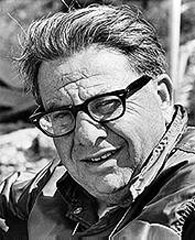
kept inquiring how he and Ms. Alexander played certain scenes on stage in an attempt to see if he (Ritt) could find an equivalent essence for the more realistically-rooted environment of the film - obviously, no comparable solution was secured.
In a coupla days we'll share our memorable dinner with author Howard Sackler and his personal preference for who was the most effective Jack Johnson.

[ Surprisingly, it wasn't who you might first imagine! ] ... 
 |
|
|
|
|
|
|
|
|
|
|
|
|
|
 |
I think the best transfer from theatre to film is the scene at Jefferson's mother's house. Because of the conflict with the ex-girlfriend, compounded by the watchful presence of, what is it, the FBI, this scene has more tension and continuity than most others in the film. It's also one of the longer scenes in the film, as well as presenting the transition of the Jefferson character out of the U.S. and off on his travels around Europe. It may even have been the last scene of Act I, though don't quote me on this.
This is the scene where Ms. Warfield got one of her big moments, with everyone sitting on her at the end, as Jefferson and his buddies take off. I remember seeing Warfield's hands stretching out in the air after him. For all her malice, I never felt her character didn't love him. And, after he's gone and the lights are coming down, her hands, resigned, slowly sink to the floor in the gloom. She's lost him.
Wonderful actress. Glad she got to do the film. One of so many actresses and actors in general, and black actresses and actors in particular, who get a few chances, and that's that. There was an actress named Diana Sands, who's in the movie of RAISIN IN THE SUN. She was stunning, gorgeous to look at, and a lovely husky voice. I first saw her at Lincoln Center, in a production of Jean Giraudoux's "Tiger at the Gates," and later in "We Bombed in New Haven," by Joseph Heller, author of "Catch-22," which also starred Jason Robards, who in those days was still known as Jason Robards Jr. Sands was wonderful. So much promise. Died young of cancer, as I recall. What a loss.
There are so many like her. I can go on and on...
BTW: I remember hearing that Yaphet Kotto, who replaced Jones on Broadway, was also very good. I even remember some people telling me he was better. But I never saw him. For some reason, maybe the cost, I usually only went to Broadway plays and musicals once. Go figure. There were some exceptions: 1776, A LITTLE NIGHT MUSIC, HOW NOW DOW JONES, FOLLIES, ZORBA!, COMPANY, DEAR WORLD, PROMISES PROMISES, EQUUS.
 |
|
|
|
|
|
 |
Yes, she replaced Bancroft. She also did Bancroft's role in Two for the Seesaw.
I did professional plays from age nine to age 32, then I got a real job, which I've had for the last 25 years! Even before my professional stage debut, I was one of the regular "kid" dancers on Bandstand. All I have from all those years, are a couple of photos and one really horrid recording from a rehearsal of The Fanstasticks (which I believe I actually posted here.) I never thought about keeping a record of any of it, any more than I have for the past 25 years in the business world. As for interesting stories, I can't imagine anyone being particularly interested in any of it.
Why were you congratulating me?
|
|
|
|
|
 |
Gee, Meester Maher, we gotta have a rollickin' reason to place plaudits before your persona ?!?!?! (ye gads, pally, you've been hangin' around these peevish parts far too long, amigo, if COMPLIMENTS elicit puzzlement rather than anal-retentive crucifixions! Yeesh!  ). ).
(And the applause was due to your debut and other auxiliary experience; wanna make somethin' of it?  Just say "Thank you, Gracie". Yer more'n welcome). Just say "Thank you, Gracie". Yer more'n welcome).

As for T.O.J. (The Other John - Bee), your assessment of the striking Ms. Warfield is right on. She did, indeed (and in-deed) have enough emotional subtext going to sense her genuine affection for Jefferson (going far beyond the superficial "woman racially scorned" bit, tho she entertainingly had that in abundance, too).
We plan to get around to the superb Diana Sands in our companion thread ("From Dorothy to Diahann to Hallie" - subtle-as-an-A-bomb professionally personal plug).
Her Beneatha in RAISIN is a revelation (aside from being the symbolically- representative stand-in for Lorraine Hansberry herself).

And the profound paradox is her early death of cancer eerily echoed Ms. Hansberry's
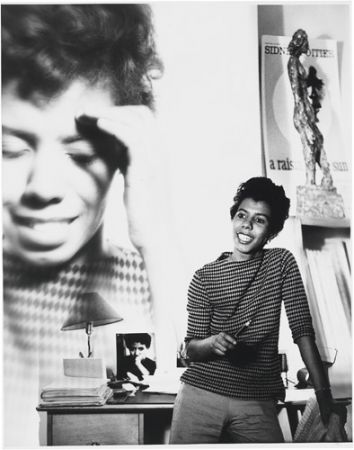
tragic foreshortening from the same affliction, also.
As for Yaphet Kotto,

funny you should mention him - stay tuned ... 
 |
|
|
|
|
|
 |
I spent a rather fun afternoon one day, with Yaphet Kotto, Patti LuPone and Tom Skerritt. My brother was working on a film (behind the scenes), and I went to the set to meet him for lunch. He was hanging with those three. I joined them, and the lunch hour turned into the better part of an afternoon. I found all three to have winning personalities, and we enjoyed lots of laughs.
|
|
|
|
|
 |
That's great. I had the hots for Mr.Skerritt, ever since I saw his laid-back character in the original MASH.
I did extra work on a few films. Seemed glamorous, actually terribly boring. I don't know how actors are able to maintain any kind of energy in between shots. I remember talking with Elizabeth McGovern on the set of RAGTIME; I think she handled it by reading Russian novels...
|
|
|
|
|
|
|
|
|
|
|
|
|
|
|
|
|
|
|
|
|
 |
From both stars

and even director Martin Ritt,

the general consensus is that the film version of
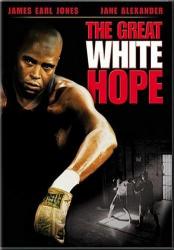
didn’t wholly measure up to the vast potential already mined and pronounced via the acclaimed stage version.
Mr. Jones acknowledged the set was beset by tensions:

"Filming was not going well. It had started going badly once 20th Century-Fox settled on the script. One of the ironies is that it should have remained a simpler movie with a smaller budget, and they should have had the wisdom to retain Ed Sherin

as director. Marty Ritt, fine film director though he was, deferred too much to the stage performances entrenched in those of us who had been through the run of the stage play.
"Often, when were wrestling with a scene for the film, he would ask us to tell him what we had done on stage. We would demonstrate, and he would try to incorporate that into the film. From the beginning, he said, ‘Give me your stage performance, I’ll modulate them.’"
If anyone’s heard the original cast Caedmon recording, one gets a general hint of the scope and scale of the stage production which, at the time the film was made (1969) would’ve required a far more substantial budget and experimentation – or simply compatible adaptation (ala what Tony Kushner was blessed with re Angels in America – to adequately do its source justice.
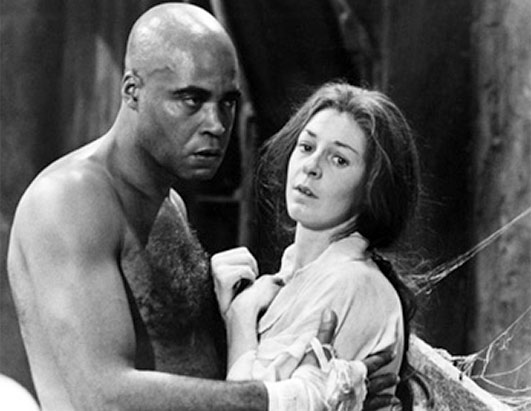
Having said that, there’s still enough sizzling intensity from Mr. Jones and Ms. Alexander to rivet one’s attention - and their dazzling break-up duet in Mexico remains one of the most titanic sequences in theatre or screen history (if you can do THAT incredible Shakespearean-scale Everest of emotional scene, you’re definitely an actor, no damn doubt about it).
Also pay particular attention to the fight finale when Jack Jefferson is knocked to the canvas and, in a simply stunning slow-motion shot, Mr. Jones’s visage and eyes reflect the danger of a wounded animal penned in.

After the finished fact, tho, the actor remained somewhat chagrined at the overall result: "The movie did not do well, but I was nominated for an Oscar [as was co-star Jane Alexander, although I thought my chances were slim. As I expected, it went to George C. Scott for Patton, and, as it turned out, he declined to accept. I was actually disappointed in my performance, and in the ultimate quality of the film. The lesson may simply be that it is almost impossible to transmute one form into another: a novel into a film, a stage drama into a motion picture. Maybe!”

His director’s assessment was compatibly conflicted also, as he believed "the two actors were terrific and Howard Sackler was onto a very hot subject. I think the film suffered, it needed something that I didn’t quite give it. The blacks I think really rejected the film ... I felt I could have done a better job on that picture."

Another Professionally Personal Anecdote Department:

We received a call one afternoon during the late '70s from a CBS executive (based in New York) we were quite fond of, Bob Markell, who asked us if we wanted to join him for dinner the next tyme he was visiting CBS headquarters in Studio City (El Lay). Now Bob was as gracious, cosmopolitan and gentlemanly an acquaintance as one could wish (as well as a top-notch production exec) so whenever he flew in, we always adjusted our schedule to see if we could at least say howdy, if nothing else.
On this particular evening, in a restaurant in Century City, it turned out he was bringing along a couple of close friends: composer Charles Gross (The Dain Curse, Country) and (get aload’a this), playwright Sackler himself. (Hell, by this point, we woulda bribed Bob to attend!).
It was quite an intoxicating evening with the food fine and company even more compelling. Naturally, our focus was on Mr. Sackler’s recollected reflections about White Hope’s arduous journey from Washington’s Arena Stage to Broadway and then onto certified celluloid.
Oddly (and thankfully) enough, he wasn’t filled to over-flowing with the anticipated horror stories about what evil Hollywood had done to his literary child. As to that, there was a charmingly bemused acceptance about it all; however, he did have one confession to make that did floor us.
While eternally indebted and fascinated by the definitive contours of the characterization
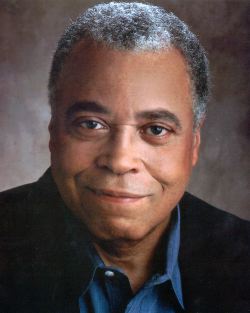
created, he still generally preferred what

did when he replaced Mr. Jones in the Broadway cast. Artistic apples and oranges, actually, as both gentlemen brought entirely different levels of illumination to the show yet we felt it was an insightful overture all the way around.

At any rate (preferably Swiss), if you’ve got a coupla hours to spare Friday nite, dew give this flawed but no less fascinating effort a look – and don’t be bashful ‘bout letting us know your reactions, also.

Promise? … 
 |
|
|
|
|
|
|
|
|
|
|
|
|
|
|
|
|
|
 |

Justice Department Turns Down Posthumous Pardon Plea – Or Who SEZ Justice Ain't Color-Blind? Department:
Various news outlets have confirmed [ the U.S. Justice Department is refusing to grant a posthumous pardon to Jack Johnson, the black heavyweight boxing champion who was imprisoned nearly a century ago because of his romantic ties with a white woman. In a letter obtained Thursday by The Associated Press, the department's pardon attorney, Ronald L. Rodgers, told Rep. Peter King that the Justice Department's general policy is not to process posthumous pardon requests.
In cases like Johnson's, given the time that has passed and the historical record that would need to be scoured, the department's resources for pardon requests are best used on behalf of people "who can truly benefit" from them, Rodgers wrote.

The letter was in response to one that King, a Republican, and Republican Senator John McCain had sent to President Barack Obama in October urging a pardon. In that letter, the two lawmakers noted that both houses of Congress have passed a resolution urging a presidential pardon and said they hoped the president would be eager to "right this wrong and erase an act of racism that sent an American citizen to prison."
Rodgers wrote that notwithstanding the department policy, Obama still has the authority to pardon whomever he wishes, "guided when he sees fit by the advice of the pardon attorney."
He also cited two cases of posthumous pardons:
President Bill Clinton's 1999 pardon of Lt. Henry O. Flipper, the Army's first black commissioned officer, who was drummed out of the military in 1882 after white officers accused him of embezzling $3,800 in commissary funds; and President George W. Bush's 2008 pardon of Charles Winters, who was convicted of violating the Neutrality Act when he conspired in 1948 to export aircraft to a foreign country in aid of Israel. ]
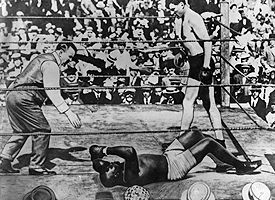
Well, we have this to say about that: forget his flamin’ ‘authority’ or politically-expedient advice; twould be nice if he put some courageously anchored ACTION behind all that alleged audacity of hope

when he conveniently parrots
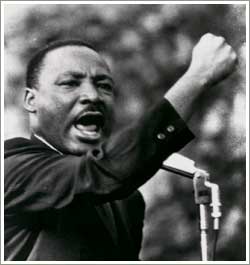
about the ‘content of character’ - 'cause there's absolutely nothing conveniently EXPEDIENT about that …   

 |
|
|
|
 |
 |
 |
|
|
 |
 |
 |
| |
|
|
|
 |
|
 |
|
|
|


